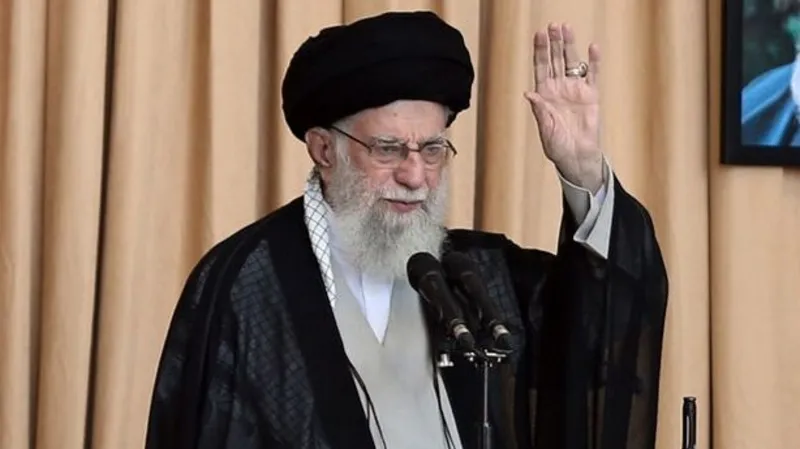Iran's supreme leader criticises US proposal for nuclear agreement

Iran's Supreme Leader Ayatollah Ali Khamenei has criticised the US proposal for a new nuclear agreement, insisting it will not stop enriching uranium.
Iranian negotiators are set to respond in the coming days to the plan presented at talks last Saturday. It would reportedly see Iran halt production of enriched uranium - which can be used to make reactor fuel but also nuclear weapons - and instead rely on a regional consortium for supplies.
In a speech on the anniversary of Ayatollah Ruhollah Khomeini's death, Khamenei said that was "100% against the idea of 'We can'" - a famous slogan of the Islamic Republic's founder.
Later, the US president said Iran was "slow-walking" its decision on a deal.
Donald Trump wrote in a post on Truth Social that he had discussed with Russian President Vladimir Putin Iran and "the fact that time is running out on Iran's decision pertaining to nuclear weapons, which must be made quickly".
"We will need a definitive answer in a very short period of time!"
Trump has warned Iran's leaders that it could face US and Israeli military action if the negotiations are not successful, and he is said to have given them a two-month deadline in a letter he sent in early March.
He has also insisted Iran would have to halt all uranium enrichment under any deal.
As supreme leader, Ayatollah Khamenei has final say on Iran's most important issues, including a potential nuclear agreement.
"Uranium enrichment is the key to our nuclear programme and the enemies have focused on the enrichment," he declared in his speech on Wednesday.
"The rude and arrogant leaders of America repeatedly demand that we should not have a nuclear programme. Who are you to decide whether Iran should have enrichment?"
Iran's chief negotiator, Foreign Minister Abbas Araghchi, wrote on X: "Iran has paid dearly for these capabilities, and there is no scenario in which we will give up on the patriots who made our dream come true."
"To reiterate: No enrichment, no deal. No nuclear weapons, we have a deal."
Under a 2015 deal with six world powers, Iran agreed to limit its nuclear activities in return for sanctions relief. That included not enriching uranium above 3.67% purity, which can be used to produce fuel for commercial nuclear power plants.
Trump abandoned the agreement during his first term in 2018, saying it did too little to stop a pathway to a bomb, and reinstated crippling economic sanctions to force Iran to renegotiate.
Iran insists its nuclear activities are entirely peaceful and that it will never seek to develop or acquire nuclear weapons. However, it has increasingly breached restrictions of the existing nuclear deal in retaliation for the sanctions.
A report from the International Atomic Energy Agency (IAEA) said last week that it had now stockpiled more than 408kg (900lb) of uranium enriched to 60% purity, near weapons grade, which would be enough to make nine nuclear bombs.
On Monday, Trump said his administration "will not allow any enrichment of uranium" by Iran.
It came in response to US media reports that the proposal presented to Omani mediators by his special envoy Steve Witkoff would allow Iran to continue production of low-enriched uranium until a regional consortium had constructed facilities to enrich uranium for civilian reactor fuel under IAEA and US supervision.
Once the facilities were operational, Iran would have to stop all enrichment in the country.
According to Axios, Iran would also not be allowed to build any new enrichment facilities, would have to dismantle infrastructure for uranium conversion and processing, and would have to halt new research and development on centrifuges used to enrich uranium. Sanctions relief would be granted once Iran "demonstrates real commitment".
White House Press Secretary Karoline Leavitt declined to comment on the reports, but said it was in Iran's "best interest to accept it".
Araghchi said on Sunday that his Omani counterpart had presented "elements of a US proposal, which will be appropriately responded to in line with the principles, national interests and rights of the people of Iran".
Last week, two Iranian officials told Reuters news agency that Iran could pause enrichment if the US released frozen Iranian funds and recognised its right to enrich uranium for civilian use under a "political deal" that could lead to a broader nuclear agreement.



0 Comments